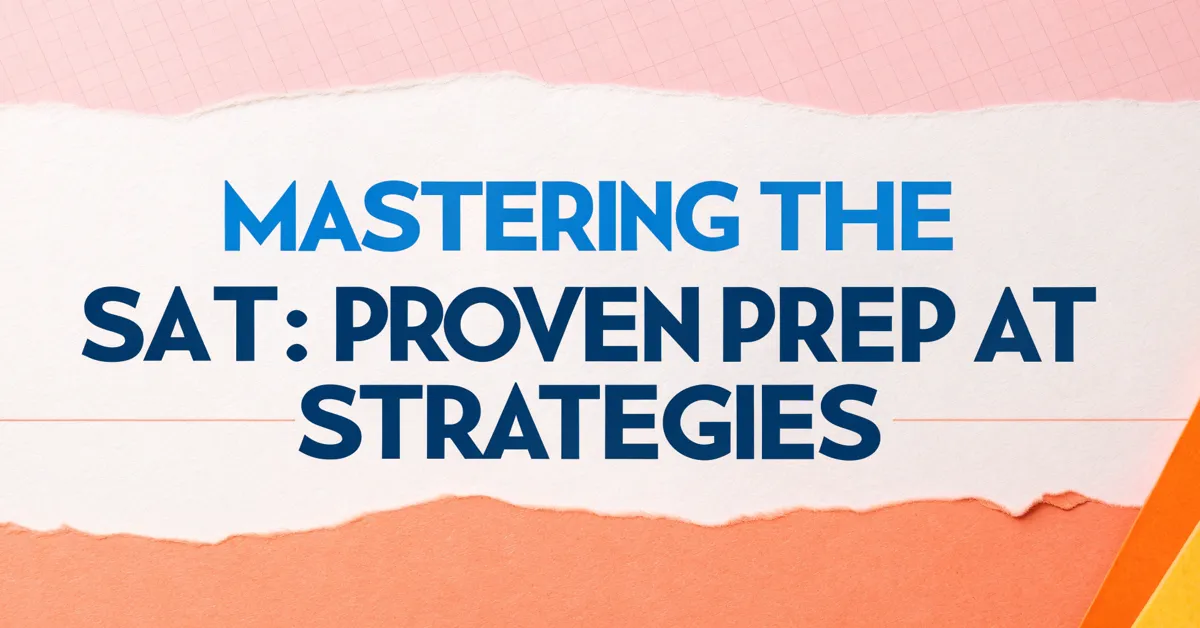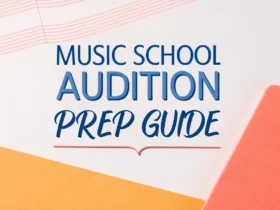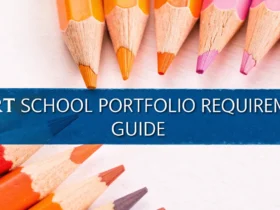Conquering the SAT: Your Guide to Achieving Success
Are you ready to take on the SAT? It might seem like a big task, but with the right game plan, you can walk into that test room with your head held high and ready to ace it. Each year, many students sweat over this exam, but it does not need to be a cause for alarm. This guide provides smart, tested plans to help you prep well. It will lead you to improve your score and get into the college you want.
This article breaks down the best ways to prep for the SAT, from making a study plan that works for you to using the top study tools and methods. We will also show you how to deal with test stress and keep your cool on test day. By using these tips, you will be ready to nail the SAT and step confidently toward your college goals.
Understanding the SAT: What to Expect
Before diving into how to prep, let’s talk about what the SAT is and what it tests. The SAT, run by the College Board, checks what you have learned in high school and how ready you are for college.
The SAT has two big parts:
- Reading and Writing: This part tests how well you read, understand, and use English.
- Math: This part looks at your skills in algebra, problem-solving, data analysis, and more.
Each part is scored out of 800, making the highest total score 1600. The SAT also has an optional essay, but most colleges do not need it anymore.
Knowing the setup and what is on the test will help you aim your prep. You will know where to spend more time and what skills to sharpen.
Creating a Personalized SAT Prep Plan
A plan made just for you is key to SAT success. Here is how to make one that fits your needs and helps you reach your score goals:
Assess Your Starting Point
First, take a full practice SAT. This helps you see where you stand now. Note what you do well and where you need to improve. Use your scores to guide your study focus.
Set Realistic Goals
Look at the average SAT scores for colleges you are eyeing. Aim for a score that makes you a strong choice. Make sure your goals are doable, given your skills and the time you have to prep.
Allocate Study Time
Think about how long you have until the SAT and how much time you can give to prep each week. Regular, shorter study times often work better than long, rare cram sessions. Try to study a bit each day to keep things fresh in your mind.
Break Down the Content
Split up the SAT content into smaller parts. Spend more time on topics that are harder for you. Mix up your study sessions to cover different areas and keep things fun.
Use a Variety of Resources
Do not just stick to one book. Use practice tests, online tools, and maybe a tutor. Mixing up your resources keeps you interested and hits the content from many angles.
Schedule Regular Practice Tests
Plan to take a full practice test every few weeks. This helps you check your progress and get used to the test format. Review your results to tweak your study plan.
Build in Rest and Flexibility
Do not forget to plan for breaks. Getting burned out can hurt your scores. Give yourself days off and change your plan if life gets in the way.
Effective SAT Study Strategies
Now that you have a plan, let us look at some smart ways to study that can boost your score.
Mastering Key Concepts
Make sure you truly get the main ideas in each part of the SAT.
- Reading and Writing: Grow your vocab, learn grammar rules, and work on understanding what you read.
- Math: Brush up on algebra, geometry, and trig. Know the formulas, but also know when and how to use them.
Active Learning Techniques
Do not just read and reread your notes. Use active ways to learn that keep you involved:
- Practice Questions: Do lots of practice questions and really look at your mistakes to learn from them.
- Teaching Others: Teach ideas to friends or family. Explaining things out loud helps you understand them better.
- Summarizing: After studying a topic, write a short summary in your own words.
- Concept Mapping: Make maps that link different ideas together. This can show you how things connect and help you recall them later.
Targeted Practice
Aim your study at the areas where you need the most help.
- Identify Weak Areas: Use your practice test results to find your weak spots.
- Focus Your Efforts: Spend more time on those trouble areas. Find extra practice questions and resources to help you improve.
- Track Your Progress: Keep an eye on how you are doing in those areas. When you start to see gains, you will know you are on the right track.
Time Management Skills
Knowing how to use your time well is key on the SAT.
- Practice with a Timer: Always use a timer when you do practice questions so you get used to the time limits.
- Pacing Strategies: Learn how long to spend on each question. If you get stuck, move on and come back later if you have time.
- Simulate Test Conditions: Take full practice tests under real test conditions to get used to the stress of the test day.
Top SAT Prep Resources
Many great tools can help you prep for the SAT. Here are some of the best:
Official SAT Practice Materials
The College Board offers free resources that are a must-use:
- Khan Academy: Has video lessons, practice questions, and full practice tests made with the College Board.
- Official SAT Study Guide: This book has real SAT questions and tips right from the test makers.
Test Prep Books
Good old books are still a great way to study.
- The Princeton Review: Known for their smart ways to beat the test and full practice tests.
- Barron’s SAT: A good choice for students aiming for high scores, with tough practice questions and deep content review.
Online Platforms and Apps
Check out these online tools for interactive learning:
- Kaplan: Has live classes, practice tests, and a lot of practice questions.
- PrepScholar: Gives custom study plans and focuses on your weak spots.
Consider a Tutor
A tutor can give you one-on-one help and a study plan just for you. Look for tutors with a record of SAT success and good reviews.
Test-Taking Tips for SAT Success
It is not just about knowing the material. How you take the test matters, too.
Before the Test
- Get Enough Sleep: Being tired can hurt your score. Aim for at least eight hours of sleep the night before.
- Eat a Good Breakfast: Choose foods that will give you lasting energy, like whole grains, protein, and fruits.
- Gather Your Supplies: Pack your ID, admission ticket, pencils, eraser, and a watch.
- Plan Your Route: Know how to get to the test center and where to park to cut down on stress on test day.
During the Test
- Read Directions Carefully: Make sure you know what each section asks before you start.
- Manage Your Time: Keep an eye on the clock and stick to your pacing plan.
- Stay Calm: If you feel stress, take a few deep breaths to calm down.
- Eliminate Wrong Answers: If you are not sure of an answer, try to rule out choices you know are wrong.
- Answer Every Question: There is no penalty for guessing, so always fill in an answer, even if you are not sure.
After the Test
- Review Your Answers: Look at the questions you got wrong to see where you can improve.
- Analyze Your Performance: See what types of questions you missed and think about changing your study plan for next time.
Dealing with Test Anxiety
Test anxiety can hurt even the best prepped students. Here is how to keep it in check:
Relaxation Techniques
Learn ways to relax that you can use before and during the test.
- Deep Breathing: Take slow, deep breaths to calm your nerves.
- Progressive Muscle Relaxation: Tighten and then relax different muscle groups in your body to ease stress.
- Visualization: Imagine yourself doing well on the test to build confidence.
Positive Self-Talk
Change negative thoughts into positive ones. Tell yourself you are ready and can handle the test.
Mindfulness
Focus on the now to keep your mind from racing. Watch your breath or feel your feet on the floor to stay grounded.
Seek Support
Talk to friends, family, or a counselor about your test anxiety. Sharing your feelings can help you feel less alone and more in control.
The Mental Game: Staying Motivated and Confident
Keeping a good mindset is just as vital as knowing the content.
Set Achievable Milestones
Set small goals to reach along the way. This makes the big task of SAT prep feel less scary and keeps you motivated.
Celebrate Small Victories
Give yourself credit for your gains, no matter how small. Each step forward is a win.
Surround Yourself with Support
Connect with people who believe in you and your goals. Having a strong support system can make a big difference.
Visualize Success
Imagine yourself doing well on the SAT and getting into your dream college. Seeing yourself succeed can build your confidence and drive.
The Role of Nutrition and Exercise
What you eat and how active you are can affect your brainpower and mood.
Brain-Boosting Foods
Eat foods that help your brain work its best:
- Omega-3 Fatty Acids: Found in fish, nuts, and seeds, these fats help brain function.
- Antioxidants: In fruits and veggies, these protect brain cells from damage.
- Whole Grains: Give a steady flow of energy to keep you focused.
Stay Hydrated
Drink lots of water to keep your brain working well. Even slight dehydration can hurt your focus and memory.
Regular Exercise
Aim for at least 30 minutes of exercise most days. Exercise lowers stress, boosts mood, and sharpens brain function.
Common SAT Prep Pitfalls to Avoid
Here are some mistakes to avoid when prepping for the SAT:
Neglecting Weak Areas
Do not just focus on what you are good at. Spend extra time on your weak spots to raise your overall score.
Cramming
Last-minute cramming rarely works and can lead to burnout. Regular, spaced-out study is much more effective.
Ignoring Test Format
Knowing the SAT format is key. Take full practice tests to get used to the timing and question types.
Overlooking Mental Health
Do not let test prep take over your life. Make time for rest, fun, and social ties to keep a healthy balance.
Preparing for the Digital SAT
In 2024, the SAT moved to a digital format. Here is what you need to know:
Familiarize Yourself with the Digital Platform
The SAT is now taken on a computer or tablet, so get used to the testing software. The College Board offers practice tests on the digital platform.
Practice Typing and Navigating
Make sure you can type quickly and smoothly. Learn how to use the digital tools, like the built-in calculator and reference sheets.
Adapt to a Shorter Test
The digital SAT is shorter, so pace yourself to get through each section in the given time.
Check Your Tech
Before test day, make sure your device is ready. Charge it fully and know how to get help if you have tech issues during the test.
Beyond the Score: Holistic College Preparation
Remember, the SAT is just one part of your college application.
Grades and Coursework
Colleges look at your grades and the classes you have taken. Aim for high grades in tough courses to show you are ready for college.
Extracurricular Activities
Get involved in clubs, sports, and volunteer work. These show you are well-rounded and passionate.
Essays and Recommendations
Write a strong essay that shows who you are and why you want to go to college. Ask teachers who know you well for good letters of recommendation.
Demonstrate Leadership
Take on leadership roles in your activities. This shows you can lead and work with others.
Is a High SAT Score Worth It?
Getting a high SAT score can open doors to many colleges and scholarships, but is it always worth the pressure?
Many schools now have a “test-optional” path. This means they do not need SAT scores. They focus more on other things, like grades, essays, and what you do outside of school.
So, if you are good at taking tests, a high score can help a lot. But if tests make you nervous, there are still ways to show how great you are without them.
Ready to Ace the SAT?
The SAT is a big test, but with the right prep, you can beat it. By using a study plan that fits you, using smart study ways, and dealing with test stress, you can reach your score goals and aim high for your college dreams.
So, take a deep breath, get your study gear ready, and start your SAT prep journey today. Your future is waiting, and you are ready to take charge.















Leave a Reply
View Comments